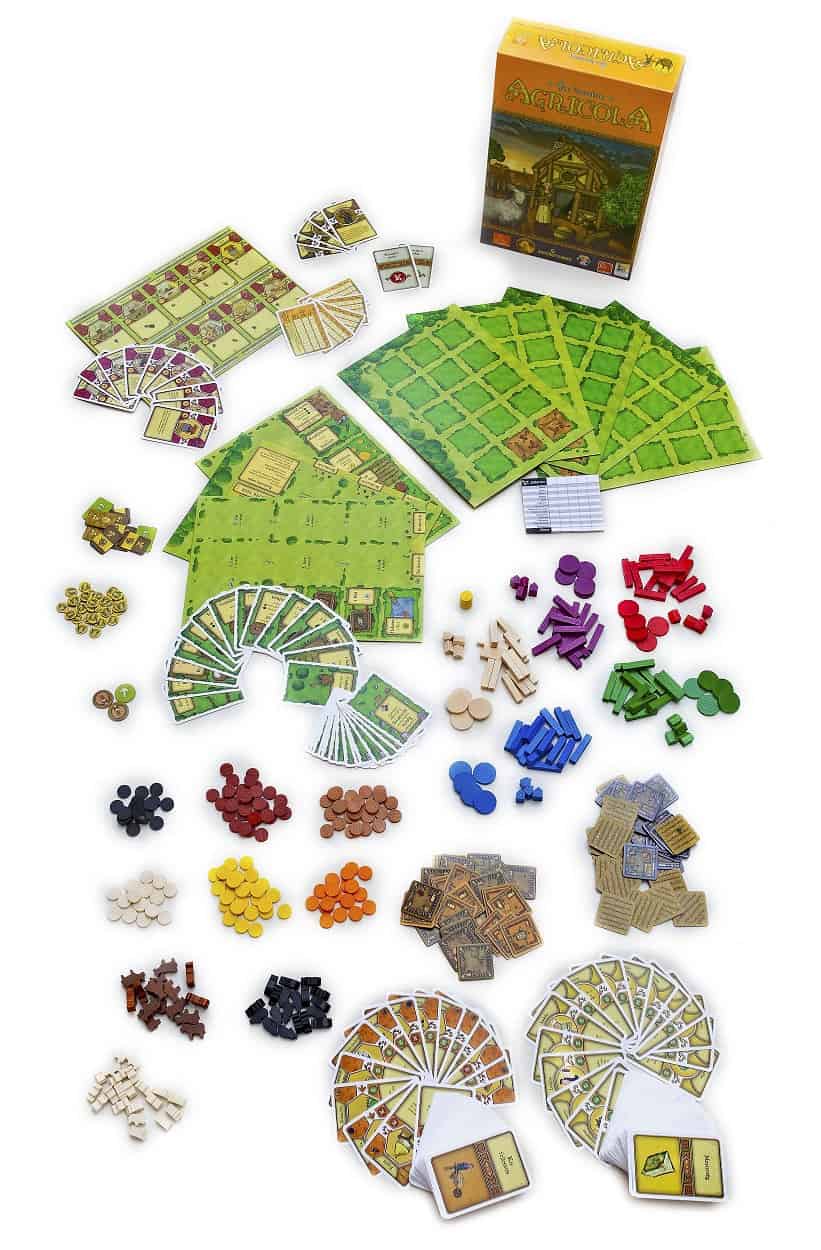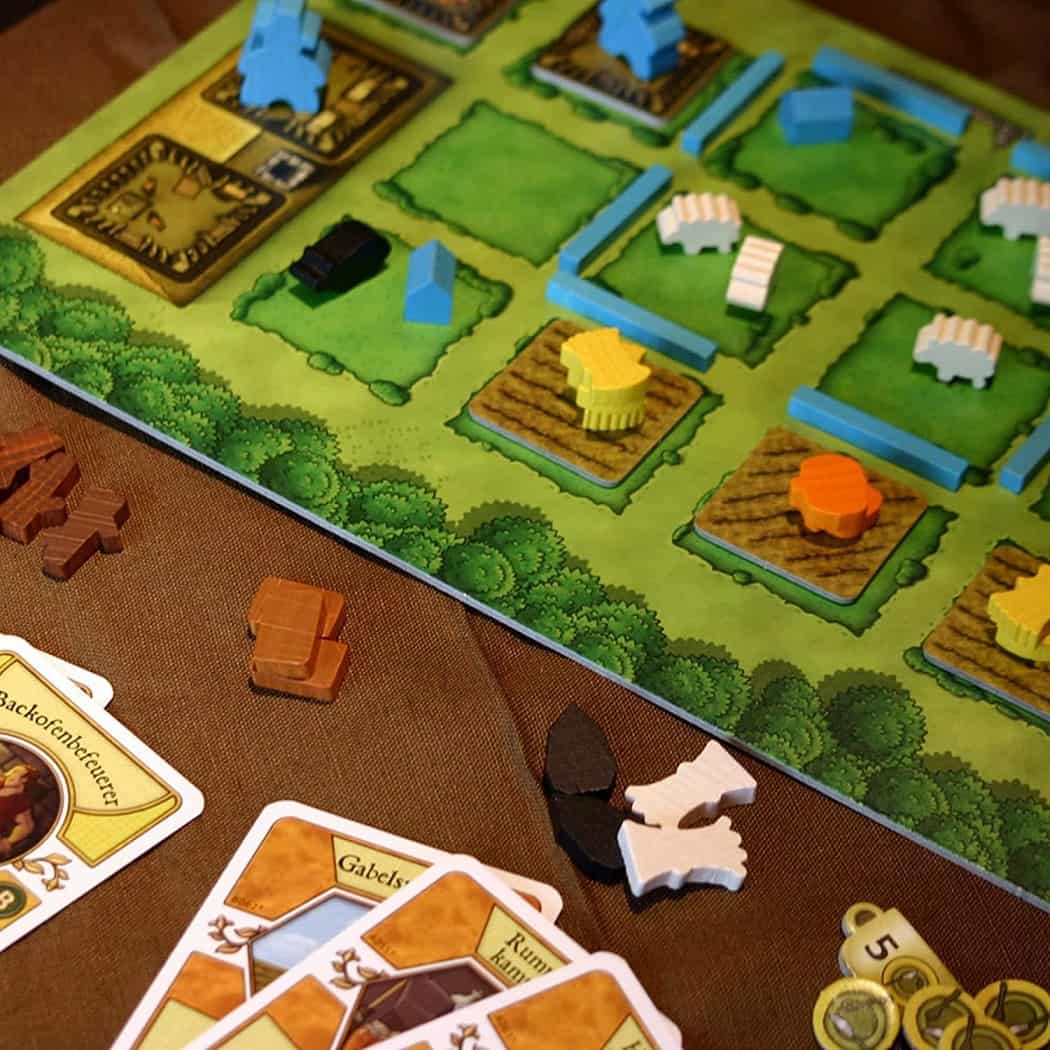In the fertile countryside of Agricola, a land of rolling hills and lush meadows, intrepid farmers embark on a grand adventure of growth and sustenance. With nothing more than a humble wooden shack and dreams of a bountiful life, they toil ceaselessly, clearing fields, sowing seeds, and tending to livestock.
Amidst this rustic odyssey, players must carefully manage their resources, cultivate crops, and raise animals to ensure a prosperous future. They face dilemmas of prioritization, as the ever-ticking seasons demand attention to various aspects of farm life.
The journey unfolds as families expand, new buildings rise from the earth, and the land transforms from barren soil to a thriving haven of agriculture. The adventure of Agricola is not one of swords and sorcery, but of sweat and strategy, where the heroics lie in the bountiful harvests and flourishing homesteads of those who dare to tame the land.
What’s included in Agricola?

- Game board representing the farmyard.
- Decks of Occupation and Minor Improvement cards.
- Wooden resource tokens (wood, clay, reed, stone, grain, vegetables, sheep, wild boar, cattle).
- Family members and action markers for each player.
- Farmyard boards for each player.
- Start Player marker.
- Various tiles representing different actions and resources.
How to play Agricola?
The goal of Agricola is to accumulate the most points by the end of the game. Points are earned by various means, including expanding your family, cultivating fields, raising livestock, and constructing buildings.

Setup
- Place the game board in the center of the table.
- Each player takes a family farmyard board, 2 food, and a wooden room tile for a one-room dwelling.
- Shuffle the Occupation and Minor Improvement decks separately and deal 7 cards from each to each player. Players choose 7 cards from these dealt cards to keep.
- Place the remaining wooden room tiles, field tiles, and resource tiles nearby.
- Determine the starting player.
Agricola Rules
Agricola is played in a series of rounds, each divided into a number of phases:
- Round Sequence:
- Each round consists of a series of actions and phases: a. Phase 1 – Start Player Phase: The start player marker is passed to the left. b. Phase 2 – Round Phases: Players take turns in clockwise order, choosing actions from a common pool of action spaces. Actions include gathering resources, expanding the farm, breeding animals, and more. c. Phase 3 – Harvest: At the end of each of the 14 rounds, a harvest occurs. Players must feed their family members using food produced on their farm or risk losing points.
- Actions:
- During each turn, players place a family member on an available action space on the game board or their farmyard board to perform that action. Actions can include collecting resources, building rooms, fences, and stables, and playing Occupation and Minor Improvement cards.
- Improvements and Expansion:
- Players can acquire and play Occupation and Minor Improvement cards that provide special abilities and bonuses.
- Expanding the farm by building rooms and fences allows for more family members, animals, and fields.
- Feeding Your Family:
- In each Harvest phase, players must feed their family members. Each family member requires 2 food.
- Food can be obtained through various means, including farming, fishing, and hunting.
- Scoring:
- At the end of the game, players calculate their scores based on their achievements in various categories, including family size, rooms, fields, animals, and improvements.
- End of the Game:
- The game ends after 14 rounds. Players tally their scores, and the player with the most points wins.
Winning: The player with the highest score at the end of the game is the winner. Points are awarded for a variety of accomplishments throughout the game, such as the size of the family, the number of rooms, and the variety of improvements.
For the official rules, see the link below:
How to win Agricola
· Diversify Your Actions: Don’t focus on just one aspect of the game (e.g. farming or animal husbandry). Diversify your actions to score points in various categories. A well-rounded farm is more likely to win.
· Expand Your Family: Increasing your family size early in the game is crucial. More family members mean more actions per round, allowing you to do more and score more points.
· Build Rooms and Fences: Expanding your farm with additional rooms and fences not only allows you to grow your family but also provides space for more animals and fields. Plan your expansions strategically.
· Secure Food Sources: Ensure you have reliable sources of food throughout the game. Farming, fishing, and hunting are good ways to acquire food. Starving your family will cost you points.
· Consider Occupation and Improvement Cards: Use Occupation and Minor Improvement cards wisely. They can provide unique abilities and advantages. Look for cards that complement your overall strategy.
· Focus on Major Improvements: In the later stages of the game, aim to build Major Improvements. These can provide significant point boosts and may help you gain an advantage over your opponents.
· Adapt to the Situation: Be flexible in your strategy. Pay attention to your opponents’ actions and adapt to the changing game state. Sometimes it’s better to block your opponents’ strategies than to stick rigidly to your own.
· Plan for Harvests: Always plan ahead for the Harvest phases. Ensure you have enough food to feed your family, and if possible, store surplus food for future rounds.
· Don’t Neglect Animal Breeding: Breeding animals can provide a steady source of food and additional points. Plan your animal husbandry strategy carefully to maximize your breeding potential.
· Maximize Point-Scoring Opportunities: Look for opportunities to score points throughout the game. This includes expanding your farm, growing your family, and improving your farm’s infrastructure.
· Pay Attention to Your Opponents: Keep an eye on what your opponents are doing. If you notice them pursuing a strategy that could lead to a high point total, consider adjusting your own strategy to compete.
· Don’t Wait Too Long: Avoid procrastinating on critical actions like expanding your family or building key improvements. Waiting too long can leave you with insufficient time to maximize their benefits.